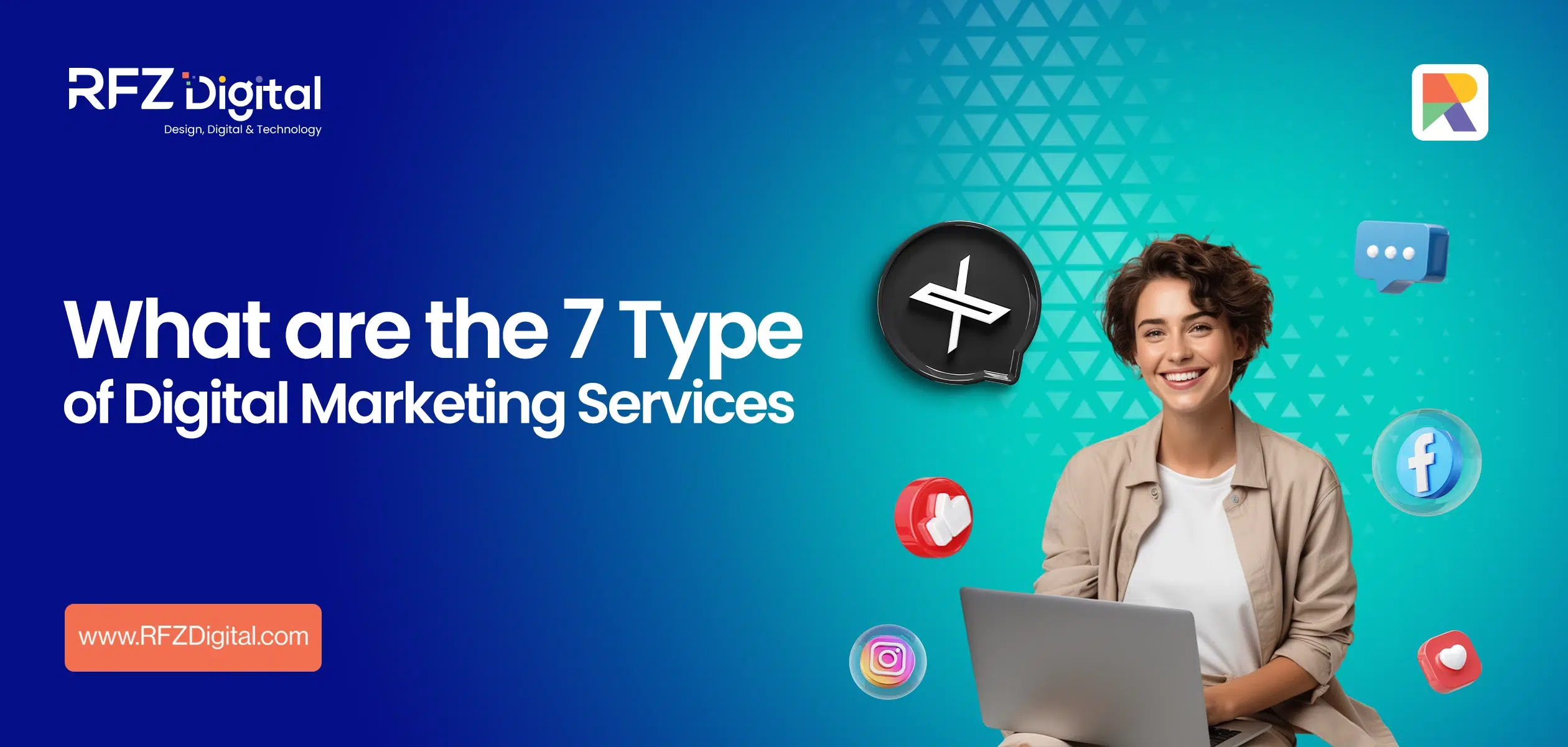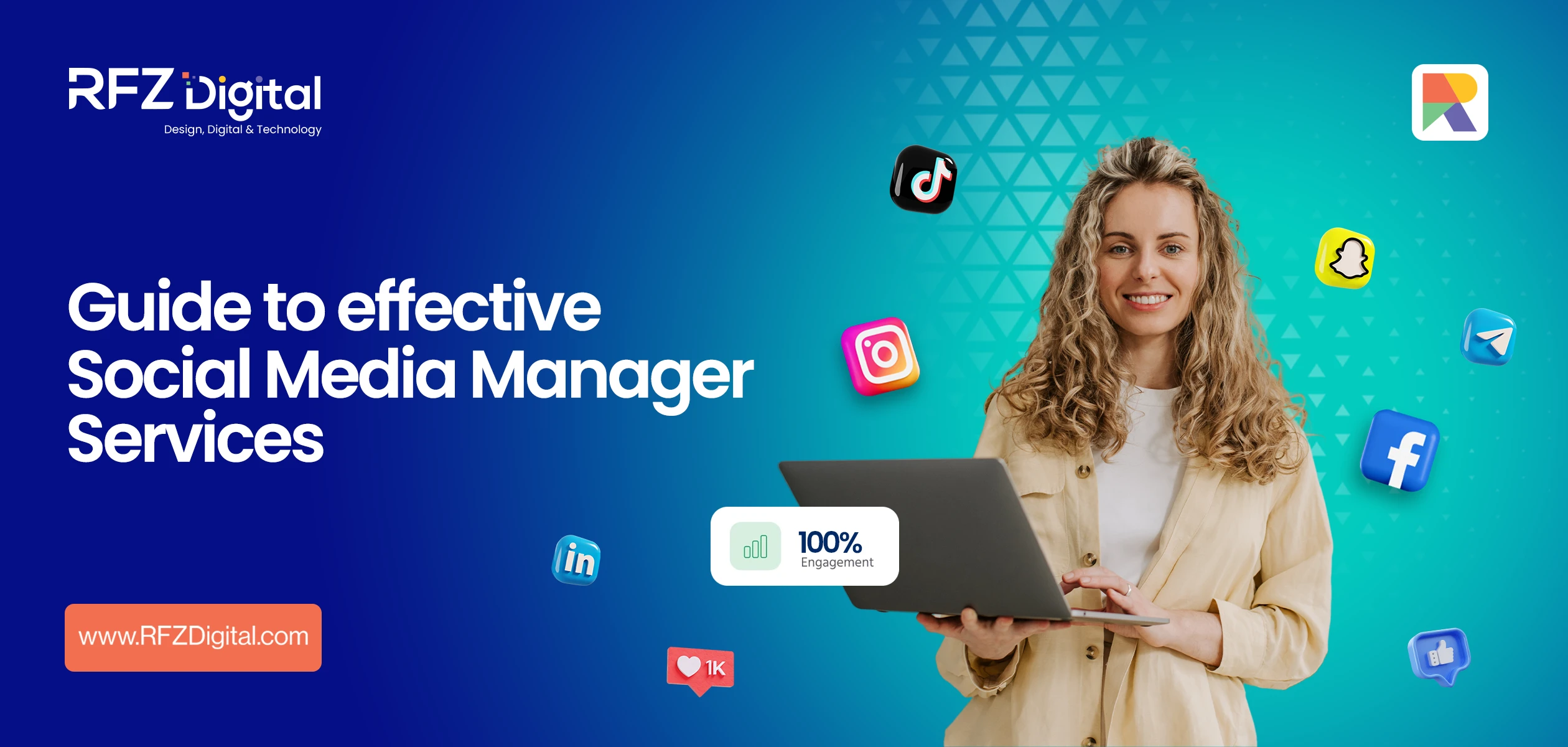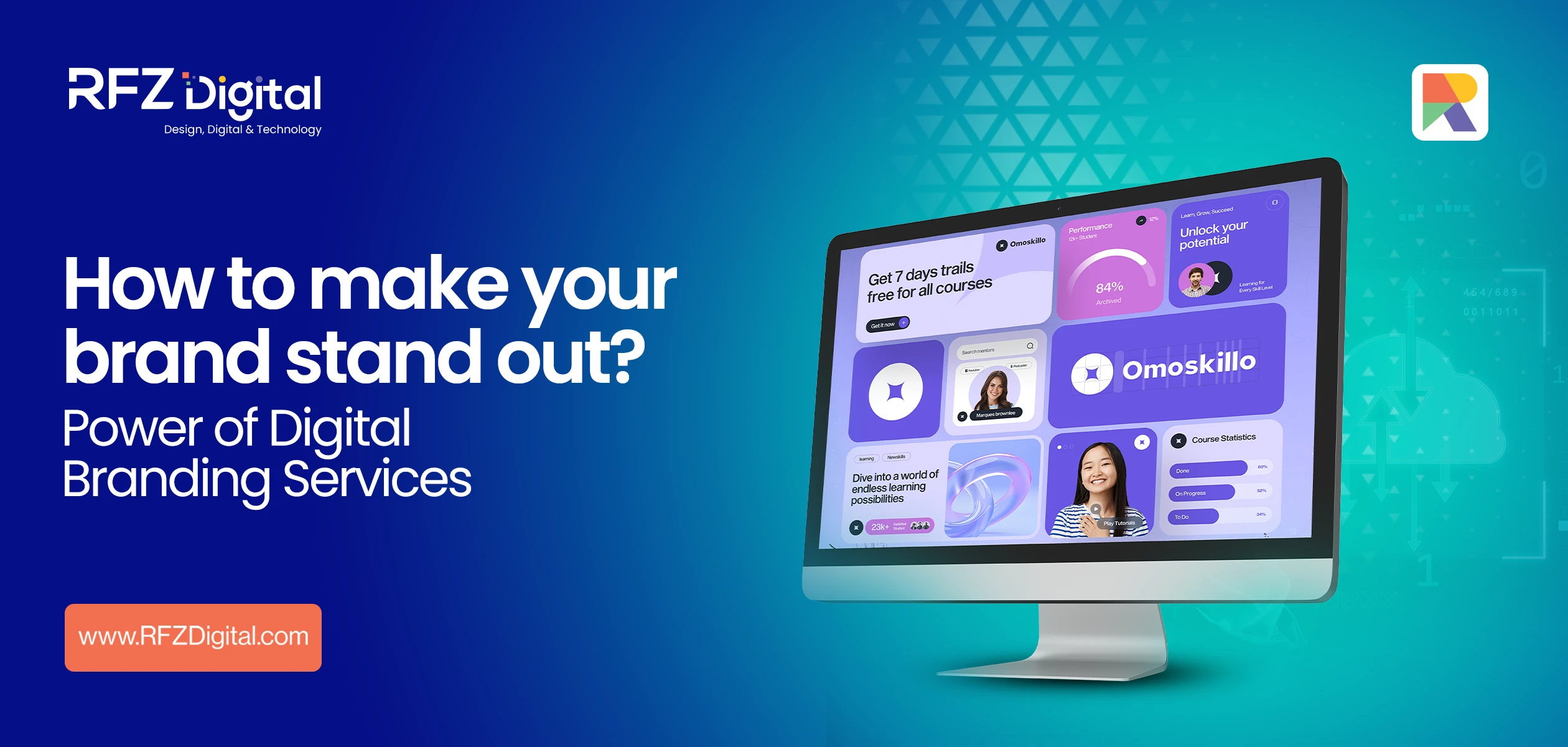Digital Marketing is an important strategy in today's online world, with a variety of online methods to connect businesses with their audience. This includes email, social media, web advertising, and even text messages. It is all about reaching people where they spend a lot of time, that is, on the internet. Digital marketing is necessary for all kinds of businesses, from small local shops to large international companies. It allows for direct and personal interaction with audiences, providing insights into what customers want and like. Unlike traditional marketing, digital marketing offers a more personalized way of communication. In an age where online content heavily influences consumer decisions, digital marketing is key for businesses to connect with potential customers, grow their brand, and increase sales. Let's go through this writing piece and learn about digital marketing services.
Types of Digital Marketing Services
Social Media Marketing (SMM)
Social Media Marketing (SMM) is a form of digital marketing that utilizes various social media platforms to connect with your audience, build your brand, increase sales, and drive website traffic. This strategy involves creating and sharing social media content to achieve marketing and branding goals. Content can range from posts and images to videos and stories made to each platform's unique features and audience. SMM's core is engaging with your audience or customers and helping them understand your brand better. It is incredibly beneficial for building a relationship with customers, providing customer service, and fostering a sense of community among followers. Platforms like Facebook, Instagram, Twitter, LinkedIn, Pinterest, and TikTok each have their unique advantages and can be used to target specific demographics.
Furthermore, SMM offers valuable insights through data analytics, which helps in understanding the preferences and behaviours of the audience. Businesses can use these insights to make informed decisions about their marketing strategies. Social media marketing is also cost-effective, making it particularly advantageous for small businesses or those with limited budgets. To be effective, SMM should involve a consistent posting schedule, high-quality content, and engagement strategies that encourage interaction and sharing. It is a vast field, requiring flexibility to new trends and platform changes to maintain importance and effectiveness.
Search Engine Marketing (SEM)
SEM, or Search Engine Marketing, is a strategy aimed at boosting your website’s visibility in search engine results through paid advertising. It is a vital tool for driving targeted traffic and achieving quick visibility. SEM typically revolves around Pay-Per-Click (PPC) campaigns, where advertisers pay for each click on their ads, making it a direct and effective marketing approach. The core of SEM lies in keyword research, similar to SEO, but with a focus on identifying terms that produce the best ROI in paid search campaigns. Making convincing ad copy and optimizing landing pages are key components.
This method targets specific audience sections and tracks and measures each campaign’s success, allowing for real-time adjustments. A well-executed SEM strategy can improve online presence and lead generation. Furthermore, SEM offers the advantage of quick results, unlike the slow impact of SEO. By strategically bidding on high-value keywords, businesses can position their ads prominently on search engine results pages, gaining instant visibility. This is beneficial for new product launches or time-sensitive promotions. Regular monitoring and adjusting of campaigns in response to performance metrics and market trends are important for maintaining the effectiveness of SEM strategies.
Search Engine Optimization (SEO)
SEO, or Search Engine Optimization, involves enhancing your website to appeal to both search engines and users. It is a key strategy for improving online presence and search engine rankings. This process includes crafting valuable content and ensuring the website is user-friendly. Mostly, SEO aims to increase brand visibility and improve positioning in search engine results pages (SERPs). The SEO journey typically starts with identifying the most relevant keywords for your potential customers to search for your products or services. This is followed by on-page and off-page optimization and technical SEO adjustments. Moreover, link building is an important yet complex feature of SEO.
Many businesses turn to professional link-building agencies to acquire high-quality, relevant links to increase their backlink profiles. Tools like Yoast can aid in optimization for those managing websites on WordPress. Moreover, SEO requires continuous revision and learning. Engaging in effective SEO is not a one-time task but an ongoing effort. Regularly updating content, optimizing website performance, and analyzing search trends are important to maintaining good control. This continuous progress in plans ensures that your website reaches its target audience more effectively and adheres to the ever-changing best practices of search engine algorithms. Staying updated with Google’s algorithm updates is crucial for effective DIY SEO.
Content Marketing
Content Marketing focuses on creating and distributing valuable, relevant, and consistent content to attract and retain a clearly defined audience. This method is important for building brand awareness and trust, eventually driving customer action. Unlike direct advertising, content marketing encourages a long-term relationship with your audience by providing them with high-quality, useful information. The process begins with identifying and understanding the target audience’s needs and preferences. This knowledge guides the creation of a variety of content types, such as blogs, videos, infographics, and social media posts.
The key is to provide content that is engaging and informative, helping to establish your brand as a thought leader in your industry. This approach helps in organically attracting and retaining a loyal customer base. Additionally, content marketing is dynamic and evolves with the changing interests and behaviours of the audience. It requires a consistent effort to produce fresh and relevant content. This ongoing process of refinement and adaptation ensures that the content remains effective in engaging the audience, enhancing brand loyalty, and improving online visibility. Effective content marketing strategy is less about overtly selling products and more about building a connection with the audience.
Pay-per-Click Advertising
Pay-per-click (PPC) Advertising is a digital marketing model where advertisers pay a fee each time one of their ads is clicked. It is a method of buying visits to your site rather than attempting to earn those visits organically. PPC is popular for its ability to drive immediate traffic and offers quick results in increasing online visibility. This approach is highly targeted, allowing advertisers to reach specific audience segments based on demographics, interests, and search behaviours. The cornerstone of PPC advertising is the effective selection and utilization of keywords. Advertisers bid on keywords relevant to their target market, and their ads appear in search engine results or on websites within the advertising network.
Creating persuasive ad copy and designing appealing landing pages are necessary for converting clicks into actions, such as sales or inquiries. Budget control is another important feature of PPC, as advertisers can set limits on daily spending and adjust their strategies based on campaign performance. Also, PPC campaigns offer measurable results, providing detailed insights into the effectiveness of the ads. Advertisers can track metrics like click-through rate (CTR), conversion rate, and return on ad spend (ROAS). This data-driven approach allows for continuous optimization of campaigns, guaranteeing that resources are utilized effectively. PPC flexibility also means it can work for various budget sizes and business types, making it an accessible marketing tool for both small businesses and large corporations. The key to successful PPC advertising lies in ongoing testing, monitoring, and refining of campaigns to align with business goals and market dynamics.
Email Marketing
Email Marketing is a powerful digital marketing strategy that involves sending emails to prospects and customers. Effective email marketing converts prospects into customers and turns one-time buyers into loyal fans. This form of marketing is important for building relationships with potential clients, keeping current customers informed, and encouraging repeat business. It allows businesses to keep their customers informed and modify their marketing messages to their audience.
Email marketing centres around building and developing a mailing list of people who have expressed interest in your products or services. It involves crafting targeted content and designing engaging email formats that can include newsletters, promotional campaigns, or personalized customer communications. Email marketing success depends on delivering relevant and valuable content that resonates with the recipient, encouraging open rates and engagement. Furthermore, email marketing is measurable and cost-effective. With advanced analytics, businesses can track open rates, click-through rates, and conversions, giving them insights into the performance of their campaigns. This data helps establish strategies, make lists, and prepare content to meet the specific needs of different audience segments. Email marketing flexibility makes it suitable for a wide range of business types and sizes, offering a personalized way to reach customers directly in their inboxes.
Affiliate Marketing
Affiliate Marketing is a performance-based marketing strategy where a business rewards one or more affiliates for each visitor or customer brought by the affiliate’s own marketing efforts. This model is a win-win for both the company and the affiliate, as it offers companies a way to expand their reach and affiliates an opportunity to earn revenue through their promotional activities. Affiliate marketing promotes a company’scompany’s products or services using a unique link. When someone clicks on this link and makes a purchase, the affiliate earns a commission. This system relies heavily on influencing the affiliates’affiliates’ existing audience and marketing skills to drive sales.
Affiliates can use various channels for promotion, including their websites, social media platforms, blogs, or email newsletters. This marketing method is beneficial for businesses as it allows for a broader market reach with a relatively low upfront investment. It is performance-based, meaning companies only pay for successful transactions. For affiliates, it offers the flexibility to choose products they are passionate about and align with their personal brand. Effective affiliate marketing requires maintaining transparent and mutually beneficial relationships between affiliates and businesses, ensuring alignment in marketing goals and audience targeting.
Mobile Marketing
In an age where mobile devices are widely used for communication and entertainment, mobile marketing offers direct and efficient access to an increasingly mobile audience. This strategy involves making content and marketing messages specifically for mobile users, considering their unique behaviour and preferences. It includes optimizing websites for mobile viewing with responsive design, creating mobile-friendly email content, engaging with users through social media platforms mainly used on mobile devices, and developing apps or mobile advertisements. The nature of mobile devices makes mobile marketing particularly effective for time-sensitive and location-specific advertising.
Mobile marketing allows for a high degree of personalization and targeting. Marketers can deliver highly relevant and customized content by utilizing data such as user location, browsing history, and app usage patterns. It also provides valuable insights into user engagement and the effectiveness of marketing campaigns, allowing businesses to polish their plans in real time. As the number of mobile users continues to grow, mobile marketing becomes important for businesses seeking to connect with their audience more directly and personally.
Influencer Marketing
Influencer Marketing is a modern marketing strategy where businesses collaborate with influential people, often on social media or blogs, to promote their products or services. These influencers have a large and engaged audience that trusts their recommendations. Businesses can effectively target and engage their desired audience through the influence of the influencer’s credibility and reach. The key to successful influencer marketing is identifying influencers whose followers align with the business’s target market. This strategy goes beyond mere celebrity endorsements; it is about finding personalities that resonate authentically with the brand’s ethos and audience.
Influencers can create various types of content like posts, stories, videos, or reviews to showcase the product in a way that feels natural and genuine to their style of content. Influencer marketing is highly effective due to its authenticity. Consumers are more likely to trust a real person over traditional forms of advertising. This strategy can also be made to any scale, suitable for businesses of all sizes. A well-executed influencer marketing campaign enhances brand visibility, builds trust, and can drive sales. It is important for businesses to establish clear goals and metrics for their influencer campaigns to measure effectiveness and return on investment.
Video Marketing
Video Marketing is a forward-looking marketing strategy that involves using video to promote and market your brand, product, or service, increase engagement on your digital and social channels, educate your consumers and customers, and reach your audience with a new medium. The compelling nature of video allows for creative storytelling and stronger emotional connections with the audience. The effectiveness of video marketing lies in its ability to capture and hold the audience’s attention, providing information in an easily digestible and visually engaging format.
Videos can be used across various platforms, including social media, websites, and emails. They range from explainer videos, product demos, customer testimonials, and live streams to interactive videos catering to different customer journey stages. Video marketing can boost SEO, as search engines favour content that engages viewers. Videos encourage longer page visits, which improves search rankings. They also have the advantage of being easily shareable, increasing the potential to go viral. With the rise of mobile technology and social media, video marketing has become increasingly accessible and impactful. It is essential for businesses to craft a clear, concise, and targeted video marketing strategy to convey their message and meet their marketing objectives effectively.
Blogging
Blogging is a digital marketing strategy that involves creating and publishing content on a blog platform to attract, engage, and add value for a target audience. It serves as an effective tool for businesses and individuals to establish authority, build brand awareness, and foster a community of engaged readers. Blogging allows for sharing insights, expertise, and stories, often leading to increased trust and credibility with the audience. The strength of blogging lies in its ability to drive organic traffic through search engine optimization (SEO). By regularly creating high-quality, relevant, and keyword-rich content, blogs can rank higher in search engine results, making it easier for potential customers to find the business online. This strategy also supports content marketing efforts, providing material that can be shared across social media and other channels.
Additionally, blogging offers a platform for direct communication with readers, enabling businesses to receive feedback, answer questions, and engage in conversations. This interaction strengthens customer relationships and provides valuable insights into customer preferences and behaviours. For long-term success, it’s crucial for blogs to maintain a consistent publishing schedule, offer valuable and unique content, and align with the overall marketing goals of the business. Blogging, when executed effectively, can be a powerful tool to attract new customers and retain existing ones.
The Bottom Line
Digital marketing is necessary for the success of businesses in the modern digital era. It offers a versatile and cost-effective way to reach a broader, more targeted audience than traditional marketing methods. By focusing on various digital channels, businesses can create a more personalized and engaging narrative for their brand.
The key lies in understanding and adapting to the evolving digital trends and consumer behaviours. In the end, effective digital marketing drives business growth and raises lasting connections with customers, laying the foundation for lasting success in the digital marketplace.
Take Your Company to New Heights with RFZ Digital
If you are looking for a digital service, RFZ Digital is the company that can assist you in elevating your business to new heights.
At RFZ, we offer personalized digital services to promote your business. Be it the service of web development or video editing; we can assist with everything from content creation to developing and designing.
No FAQs found for this blog.

 0
0





Comments:
No comments yet. Be the first to comment!